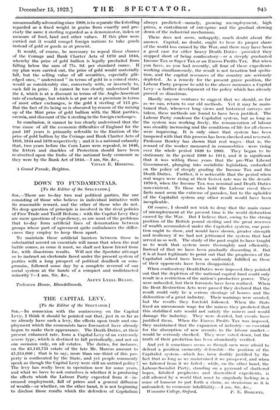THE CAPITAL LEVY.
[To the Editor of the SPECTATOR.] SIR,—In connexion with the controversy on the Capital Levy, I think it should be pointed out that, just in so far as we already have such a levy, the effects upon trade and em- ployment which the economists have forecasted have already begun to make their appearance. The Death Duties, at their present enhanced rate, form a Capital Levy of an extremely severe type, which is destined to fall periodically, and not on one occasion only, on all estates. The duties, for instance, on the £3,145,751 estate of the late Mr. Marcus amount to £1,354,000 ; that is to say, more than one-third of this pro- perty is confiscated by the State, and yet people commonly speak as though the Capital Levy were still an untried policy ! The levy has really been in operation now for some, years, and what we have to ask ourselves is whether it is producing the effects which the Labour Party expected from it—in- creased employment, fall of prices and a general diffusion of wealth—or whether, on the other hand, it is not beginning to disclose those results which the defenders of Capitalism
always predicted—namely, growing unemployment, high prices, a curtailment of enterprise and the gradual slowing down of the industrial mechanism.
There does not seem, unhappily, much doubt about the answer. Capital, no doubt, ought to bear its proper share of the world loss caused by the War, and there may have been a good case for • either heavy Death Duties—provided they stopped short of being confiscatory—or a steeply graduated Income Tax or Super Tax or an Excess Profits Tax. But when you have, as you had recently, all four of these expedients working simultaneously, the result is not taxation but spolia- tion, and the capital resources of the country are seriously depleted. As a remedy for the present grave position, the Labour Party propose to add to the above measures a Capital Levy—a further development of the policy which has already proved so disastrous.
Hardly anyone ventures to suggest that we should, as far as we can, return to our old methods. Yet it may be main- tained that, whenever long views and historical surveys are taken, these methods are found to have been justified. The Labour Party condemn the Capitalist system, but as long as the system was working freely, the remuneration of labour was steadily increasing and the conditions of life for all classes were improving. It is only since that system has been tampered with that this process has been checked and reversed. Professor Bowley has shown that real wages—tlust is, the reward of the worker measured in commodities—were rising over the whole period 1830 to 1900. They began to be stationary in the period 1900 to 1914, and it is significant that it was within those years that the pre-War Liberal Government, plunging into socialistic legislation, embarked on the policy of steeply grading the Income Tax and the Death Duties. Further, it is noticeable that the period when real wages were rising at their fastest rate was in the decade 1870-9, when the Income Tax was nominal and Death Duties non-existent. To those who hold the Labour creed these facts must seem the extreme of paradox, but to the upholder of the Capitalist system any other result would have been inexplicable.
Of course, I should not wish to deny that the main cause of unemployment at the present time is the world dislocation caused by the War. But I believe that, owing to the ro
.stng position of the British pound sterling and the great reserves of wealth accumulated under the Capitalist system, our posi- tion ought to show, and would have shown, greater strength and resiliency if we had not jettisoned the system that had served us so well. The study of the past ought to have taught us to work that system more thoroughly and efficiently. Instead of that we have been gradually discarding it. But it is at least legitimate to point out that the prophecies of the Capitalist school have been as uniformly fulfilled as those
of their opponents have been disappointed. • When confiscatory Death Duties were imposed, they pointed out that the depletion of the national capital fund could only result in a restriction of the nation's productive power. They were unheeded, but their forecasts have been realized. When the Rent Restriction Acts were passed they declared that the result could only be a serious shortage of houses and the dislocation of a great industry. Their warnings were scouted, but the results they foretold followed. When the State fixed an uneconomic wage for the miners they predicted that this stabilized rate would not satisfy the miners and would damage the industry. They were derided, but events have justified them. When the Excess Profits Tax was imposed, they maintained that the expansion of industry—so essential for the absorption of new recruits to the labour market— would be seriously checked. They were voted down, but the truth of their prediction has been abundantly verified.
And yet it sometimes seems as though men were afraid to defend a position eminently defensible—the position of the Capitalist system—which has been doubly justified by the fact that as long as we maintained it we prospered, and when we faltered from it we failed ; while, on the other hand, the Labour-Socialist Party, standing on a pyramid of shattered hopes, falsified prophecies and discredited expedients, is still allowed by a world that must be singularly lacking in a sense of humour to put forth a claim, as stentorian as it is unfounded, to economic am, Sir, &c.,


















































 Previous page
Previous page